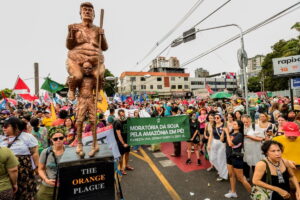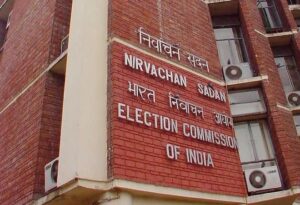Belém’s Streets Turn Red, Black And Green As People March For Climate Justice

Family farmers, traditional communities, Indigenous peoples and nonprofits led the Unified March of the People’s Summit, demanding climate action for farmers and Indigenous groups (Image by Soumya Sarkar)
- The end of the first week of COP30 saw a protest organized by social and environmental movements, bringing together Indigenous groups, youth, NGOs, and activists demanding climate justice, an end to fossil fuels, and real participation in negotiations.
- Protesters demanded land rights, agrarian reform, agroecology support and climate reparations, while opposing fossil fuels, agribusiness expansion, and oil exploration.
- The demonstrations presented a counter-narrative to formal COP30 negotiations, stressing that frontline communities who protect forests, rivers and farmlands must be central to any just climate transition.
Family farmers, traditional communities and Indigenous peoples led the People’s Summit Unified March, a climate justice protest, on November 15, bringing colour and movement to the streets of Belém, Brazil.

Delegations to what was called the “Great People’s March” arrived in bright, feathered head-dresses, beaded chest pieces, painted faces, woven skirts, and body art created with natural dyes like jenipapo and urucum, traditional Amazonian plant-based colourants. Their presence turned the avenues into a moving tapestry of forest cultures calling for climate justice and stronger protection of Amazonian territories.
The march drew thousands, just days after two Indigenous-led protests, on November 12 and 14, interrupted official COP30 proceedings. These earlier actions set the tone for a week in which Indigenous peoples, family farmers and local communities placed territorial struggles at the centre of the climate debate.
Farmers’ unions stated that despite being among the groups most vulnerable to extreme weather, they remain key contributors to climate solutions through agroecology, a farming approach that works in harmony with natural systems and local knowledge.
Farmers highlight unequal climate impacts
The march, at the end of the first week of the climate conference, went 4.5 km through Belém. Rural organisations walked alongside Indigenous peoples and the traditional Quilombola community. Together, they demanded land rights, agrarian reform, agroecological support, and protection from the expansion of commodity frontiers, according to statements from groups participating in the People’s Summit or the march.
Several delegations renewed demands for climate reparations to support poor and marginalised communities whose contributions to global warming are minimal but whose suffering is severe.
Marcos Vinicius, Vice President of CONTAG (Confederação Nacional dos Trabalhadores na Agricultura), stressed the central role of family farmers in confronting the climate emergency, as many of them from across Brazil participated in the march. CONTAG is Brazil’s largest national organisation representing family farmers, rural workers, traditional peoples and communities. “Family farming is essential to confronting the climate crisis. Farmers suffer the most from extreme climate events. They also contribute the most to mitigation through sustainable practices and the protection of territories. They must be recognised as key actors in addressing the climate emergency. Our presence in the march reinforces the urgency of public policies that ensure a just transition.”
Resistance to extractive and commercial pressures
Many of those in the march dressed in black to symbolise a funeral for fossil fuels. Demonstrators carried three coffins marked “coal,” “oil”, and “gas.” Hundreds of others wore red shirts in tribute to environmental defenders killed while protecting forests, rivers and territories.

Groups also held a large Brazilian flag printed with the words “Protected Amazon,” calling attention to the country’s most important climate asset. The Amazon rainforest, the largest rainforest on earth, remains threatened by deforestation, land grabbing and industrial agriculture.
Participants raised concerns about the Ferrogrão railway, a proposed export corridor for soy and corn that critics say threatens Indigenous lands and forest areas. Protesters also challenged oil exploration at the mouth of the Amazon, where the river meets the Atlantic ocean, as well as the expansion of agribusiness.
International nonprofit organisations joined the march. Mighty Earth supported the Amazon Soy Moratorium, which restricts the cultivation of soy on land recently cleared of forest. Boris Patentreger, Global Nature Lead at Mighty Earth, explained their participation, saying, “Critical forest protections are on the verge of collapse. Indigenous Peoples’ frustrations are boiling over at the commodity-driven land grabbing in their territories, particularly from the meat industry in Brazil. The Amazon Soy Moratorium (ASM) is the thin green line between the Amazon rainforest, the destruction of indigenous ancestral lands and the meat companies’ bulldozers. It cannot be allowed to fail.” The ASM is a voluntary agreement created in 2006 by soy traders, NGOs and the Brazilian government. It states that soy companies will not buy soy grown on land in the Amazon that was deforested after 2008.
For many marchers, the strong presence of farmers, Indigenous peoples and forest communities offered a counter-narrative to COP30. They said formal negotiations often overlook the knowledge of the people who feed cities, protect landscapes and restore degraded areas.
As the procession moved through Belém, one message repeated across speeches, drums and hand-painted signs — climate justice must include the people who grow food and defend territories. Without them, no transition can be just or sustainable.





